六年级英语下册第二单元知识点整理人教版
六年级下册英语第二单元知识点总结
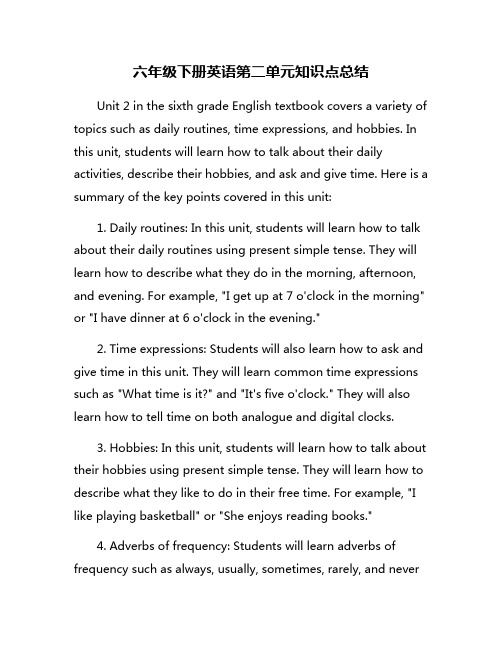
六年级下册英语第二单元知识点总结Unit 2 in the sixth grade English textbook covers a variety of topics such as daily routines, time expressions, and hobbies. In this unit, students will learn how to talk about their daily activities, describe their hobbies, and ask and give time. Here is a summary of the key points covered in this unit:1. Daily routines: In this unit, students will learn how to talk about their daily routines using present simple tense. They will learn how to describe what they do in the morning, afternoon, and evening. For example, "I get up at 7 o'clock in the morning" or "I have dinner at 6 o'clock in the evening."2. Time expressions: Students will also learn how to ask and give time in this unit. They will learn common time expressions such as "What time is it?" and "It's five o'clock." They will also learn how to tell time on both analogue and digital clocks.3. Hobbies: In this unit, students will learn how to talk about their hobbies using present simple tense. They will learn how to describe what they like to do in their free time. For example, "I like playing basketball" or "She enjoys reading books."4. Adverbs of frequency: Students will learn adverbs of frequency such as always, usually, sometimes, rarely, and neverto talk about how often they do certain activities. For example, "I always brush my teeth before bed" or "She rarely goes shopping on weekends."5. Phrases for invitations and suggestions: Students will also learn how to make invitations and suggestions in this unit. They will learn phrases such as "Would you like to come to my house for dinner?" and "How about going to the movies this weekend?"Overall, Unit 2 is a comprehensive unit that covers a range of important topics related to daily routines, time expressions, and hobbies. By the end of this unit, students should be able to confidently talk about their daily activities, hobbies, and make invitations and suggestions in English.。
人教精通版六下英语第二单元知识点总结
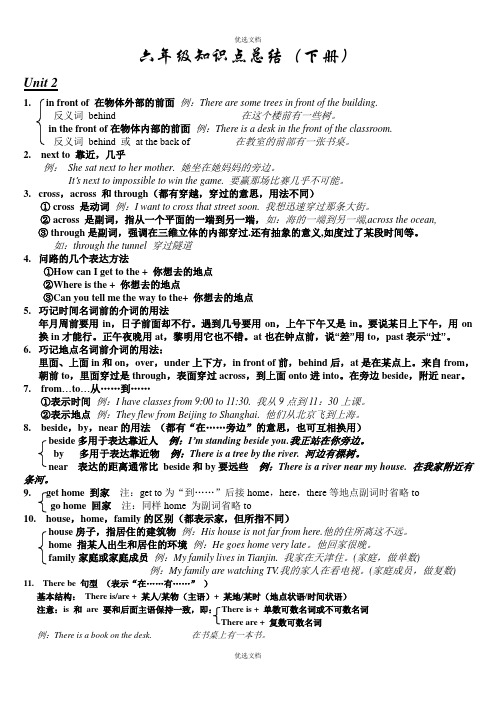
六年级知识点总结(下册)Unit 21. in front of 在物体外部的前面例:There are some trees in front of the building.反义词behind在这个楼前有一些树。
in the front of在物体内部的前面例:There is a desk in the front of the classroom.反义词behind 或at the back of在教室的前部有一张书桌。
2.next to 靠近,几乎例:She sat next to her mother. 她坐在她妈妈的旁边。
It’s next to impossible to win the game. 要赢那场比赛几乎不可能。
3.cross,across 和through(都有穿越,穿过的意思,用法不同)① cross 是动词例:I want to cross that street soon. 我想迅速穿过那条大街。
② across 是副词,指从一个平面的一端到另一端,如:海的一端到另一端,across the ocean,③ through是副词,强调在三维立体的内部穿过.还有抽象的意义,如度过了某段时间等。
如:through the tunnel 穿过隧道4.问路的几个表达方法①How can I get to the + 你想去的地点②Where is the + 你想去的地点③Can you tell me the way to the+ 你想去的地点5.巧记时间名词前的介词的用法年月周前要用in,日子前面却不行。
遇到几号要用on,上午下午又是in。
要说某日上下午,用on 换in才能行。
正午夜晚用at,黎明用它也不错。
at也在钟点前,说“差”用to,past表示“过”。
6.巧记地点名词前介词的用法:里面、上面in和on,over,under上下方,in front of前,behind后,at是在某点上。
人教版六年级英语下册各单元知识点总结归纳
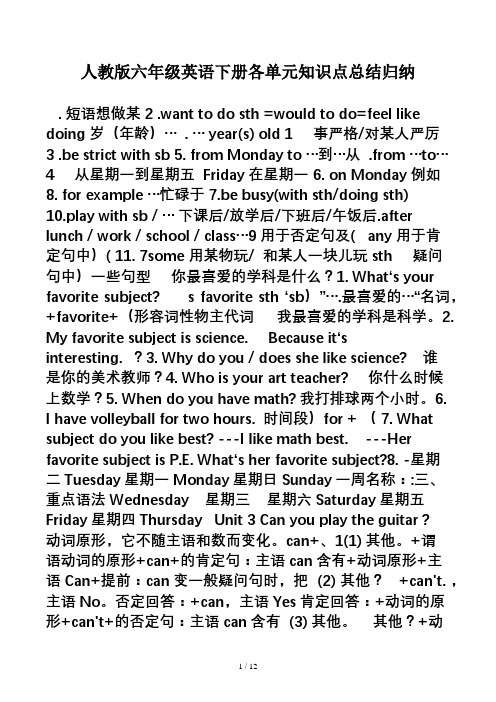
人教版六年级英语下册各单元知识点总结归纳. 短语想做某2 .want to do sth =would to do=feel like doing岁(年龄)… . … year(s) old 1 事严格/对某人严厉3 .be strict with sb 5. from Monday to …到…从.from …to…4 从星期一到星期五 Friday 在星期一 6. on Monday 例如8. for example …忙碌于 7.be busy(with sth/doing sth)10.play with sb / … 下课后/放学后/下班后/午饭后.afterlunch / work / school / class…9用于否定句及( any 用于肯定句中)( 11. 7some 用某物玩/ 和某人一块儿玩sth 疑问句中)一些句型你最喜爱的学科是什么?1. What‘s your favorite subject? s favorite sth ‘sb)”….最喜爱的…“名词,+favorite+(形容词性物主代词我最喜爱的学科是科学。
2. My favorite subject is science. Because it‘sinteresting. ?3. Why do you / does she like science? 谁是你的美术教师?4. Who is your art teacher? 你什么时候上数学?5. When do you have math? 我打排球两个小时。
6.I have volleyball for two hours. 时间段)for + ( 7. What subject do you like best? ---I like math best. ---Her favorite subject is P.E. What‘s her favorite subject?8. -星期二Tuesday星期一Monday星期日Sunday一周名称::三、重点语法Wednesday 星期三星期六Saturday星期五Friday星期四Thursday Unit 3 Can you play the guitar ? 动词原形,它不随主语和数而变化。
人教版英语六年级第二单元知识点归纳

Unit2Waystogotoschool一、重点短语:b yship乘船Onfoot走路bybus乘公共汽车bytaxi乘出租汽车byplane乘飞机b ytrain乘火车gotoschool去学校bysubway乘地铁二、重点句型:1.Howdowegettothenaturepark?我们怎么到达自然公园?2.Wegotothenatureparkbybus.我们乘公交汽车去自然公园。
3.Howdoyoucometoschool?你怎么来学校?4.Ioftencomebybike.我经常骑自行车来。
5.Slowdownandstopatayellowlight.黄灯慢下来并停下。
6.Stopandwaitataredlight.红灯慢下来并等一等。
7.Goatagreenlight.绿灯停。
三、重点语法:1、问路时要用"excuseme对不起,打扰一下"词:first首先,next接着,then然后2、描述路时可以用顺序3、near表示在附近,nextto表示与⋯相邻。
它的范围比n ear小。
infrontof在。
前面behind在⋯⋯后面4、在左边,在右边介词要用on,ontheleft/ontheright,但是东西南北,介词要用in,inthenorth/east/south/west.5、for表示持续多长时间,当表示做某事多长时间都要用for.?如:Walkeastfor5 minutes.??Thenwalkstraightforthreeminutes.6、乘几路车可以用bytheNo.301bus,注意No.中N要大写,后面要加点。
如果要用动词可以用take,例如taketheNo.301bus.7、当表示某个地方在另一个地方的哪一方向时,要用介词of。
如:thehospitaliseast ofthecinema.医院在电影院的东边。
8、表示在哪儿转时,用介词at。
最新人教版六年级英语下册各单元知识点总结归纳
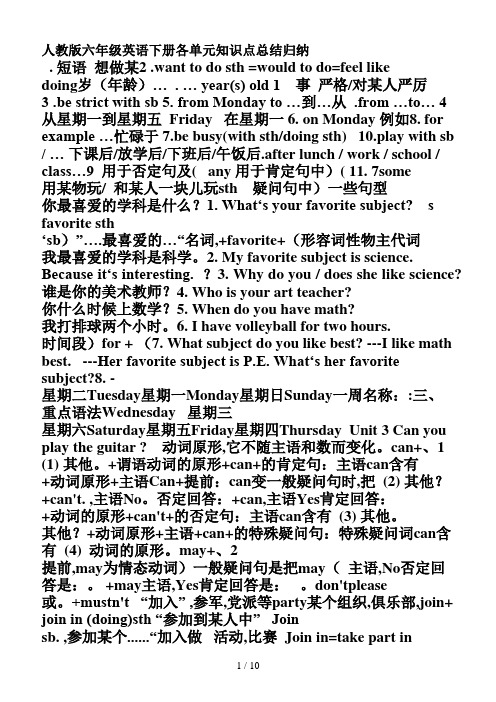
人教版六年级英语下册各单元知识点总结归纳. 短语想做某2 .want to do sth =would to do=feel likedoing岁(年龄)… . … year(s) old 1 事严格/对某人严厉3 .be strict with sb 5. from Monday to ...到...从 .from ...to (4)从星期一到星期五 Friday 在星期一 6. on Monday 例如8. for example …忙碌于 7.be busy(with sth/doing sth) 10.play with sb / … 下课后/放学后/下班后/午饭后.after lunch / work / school / class…9 用于否定句及( any 用于肯定句中)( 11. 7some用某物玩/ 和某人一块儿玩sth 疑问句中)一些句型你最喜爱的学科是什么?1. What‘s your favorite subject? s favorite sth‘sb)”….最喜爱的…“名词,+favorite+(形容词性物主代词我最喜爱的学科是科学。
2. My favorite subject is science. Because it‘s interesting. ?3. Why do you / does she like science? 谁是你的美术教师?4. Who is your art teacher?你什么时候上数学?5. When do you have math?我打排球两个小时。
6. I have volleyball for two hours.时间段)for + (7. What subject do you like best? ---I like math best. ---Her favorite subject is P.E. What‘s her favorite subject?8. -星期二Tuesday星期一Monday星期日Sunday一周名称::三、重点语法Wednesday 星期三星期六Saturday星期五Friday星期四Thursday Unit 3 Can you play the guitar ? 动词原形,它不随主语和数而变化。
人教版英语六年级下册第二单元知识点归纳总结复习

人教版英语六年级下册第二单元知识点归纳总结复习本文旨在对人教版英语六年级下册第二单元的知识点进行归纳总结和复,以便同学们更好地掌握和运用英语知识。
一、语音单词发音:1. 内含元音字母e的单词,重读部分字母e发[i:](如w i pe,pre fer,t e n),非重读部分字母e发[ə](如op e n,nic e )。
2. 内含元音字母a的单词,底音发[æ](如c a t,a pple,b a g),有些单词在意大利语中,底音是开音[a](如p a sta)。
3. 内含元音字母o的单词,重读部分发[əʊ](如bl ow ,gr ow ),非重读部分发[ə](如ph ot o),内含元音字母o和e的单词,重读部分发[əʊ](如sh ow er),非重读部分发[ɪ](如w om e n)。
4. 指在a, o, u三个元音字母后的r的发音,在美式英语中基本不发音,而在英式英语中喜欢将发音弱化,只用[r]表示(如st a r,b o th,p u rple)。
二、语法1. 本单元主要研究there be句型, 即“有”句型。
构成方式为:there + be动词(am, is, are)+ 名词或代词。
2. 动词的第三人称单数的构成方式:一般情况下在动词后直接加s。
但以下几类动词除外:(1)以s, x, ch, sh结尾的动词,直接加es(如watch → watches,fix → fixes,pass → passes,brush → brushes)。
(2)以辅音字母+y结尾的动词,改y为i再加es(如carry → carries,study → studies)。
(3)以o结尾的动词,有的在词尾直接加s(如go → goes),有的加es(如do → does),还有的变成es(如potato → potatoes)。
三、词汇2. 这些单词需要同学们反复背诵和使用,以便记忆更加深刻。
JOIN IN六年级下册英语课本知识点总结(Unit 2 Food and health)
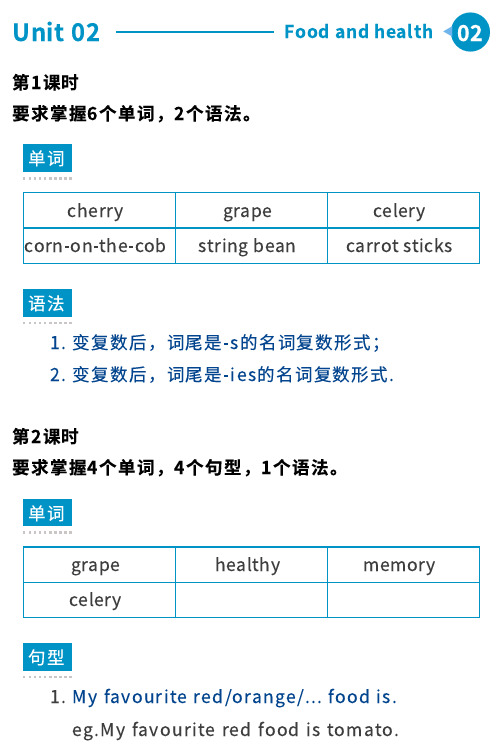
Unit 02Food and health02第1课时要求掌握6个单词,2个语法。
cherry grape celerycorn-on-the-cob string bean carrot sticks1. 变复数后,词尾是-s的名词复数形式;2. 变复数后,词尾是-ies的名词复数形式.第2课时要求掌握4个单词,4个句型,1个语法。
grape healthy memorycelery1. My favourite red/orange/... food is.eg.My favourite red food is tomato.2. ... is/are good for ...eg.Red fruit and vegetables are good foryour heart.3. ... help/helps keep sb. from + V-ing...eg.Yellow fruit and vegetables help keepyou from getting ill.4. What s your favourite food/drink?1. 介词/介词短语-⽬的/原因-for第3课时要求掌握5个单词,3个句型,1个语法。
chips drink healthhealthy stay1. ... is/are good for ...eg.Red fruit and vegetables are good foryour heart.2. ... is/are bad for ...eg.Cola is bad for your health.3. Sth. is/are (not) healthy.eg.Vegetables are healthy.1. 介词/介词短语-⽬的/原因-for第4课时要求掌握11个单词,2个句型,1个语法。
active drink glasshabit healthy ownstay sugar protein plenty(of)whole grains1. Eat more+饮⻝.eg.Eat more vegetables.2. Eat/Drink+饮⻝+with sth..eg.Eat some food with healthy protein.1. 形容词/副词⽐较级的不规则变化第5课时要求掌握2个单词,7个句型,1个语法。
人教版六年级下册英语第二单元知识点
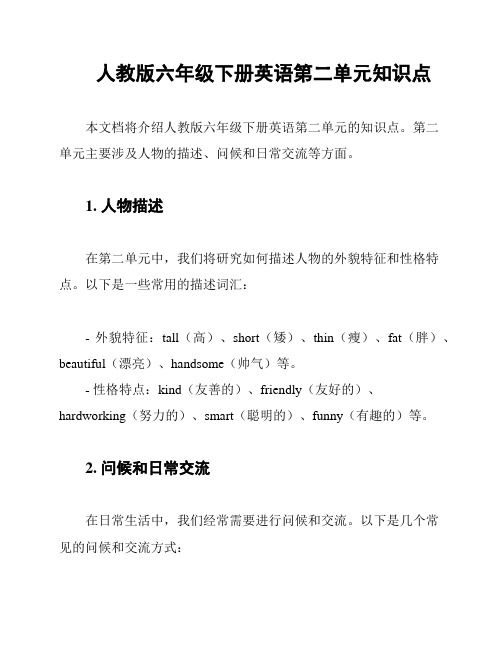
人教版六年级下册英语第二单元知识点本文档将介绍人教版六年级下册英语第二单元的知识点。
第二单元主要涉及人物的描述、问候和日常交流等方面。
1. 人物描述在第二单元中,我们将研究如何描述人物的外貌特征和性格特点。
以下是一些常用的描述词汇:- 外貌特征:tall(高)、short(矮)、thin(瘦)、fat(胖)、beautiful(漂亮)、handsome(帅气)等。
- 性格特点:kind(友善的)、friendly(友好的)、hardworking(努力的)、smart(聪明的)、funny(有趣的)等。
2. 问候和日常交流在日常生活中,我们经常需要进行问候和交流。
以下是几个常见的问候和交流方式:- 问候语:Hello!(你好!)、Good morning!(早上好!)、How are you?(你好吗?)等。
- 介绍自己:My name is...(我叫...)、I am...(我是...)等。
- 询问对方:What's your name?(你叫什么名字?)、How old are you?(你多大了?)、Where are you from?(你来自哪里?)等。
3. 相关词汇和句子接下来是一些与第二单元相关的常用词汇和句子:- 名词:student(学生)、teacher(老师)、classroom(教室)、school(学校)等。
- 动词:study(研究)、read(读)、write(写)、listen(听)等。
- 句子:I am a student.(我是学生。
)、She is my teacher.(她是我的老师。
)、Where is the classroom?(教室在哪里?)等。
总结人教版六年级下册英语第二单元主要涉及人物的描述、问候和日常交流。
通过掌握描述词汇、常用句子和问候方式,我们能够更好地与他人交流和表达自己。
希望这些知识点能帮助你更好地研究和使用英语。
以上就是本文对人教版六年级下册英语第二单元的知识点的介绍。
(完整版)人教版六年级下册英语知识点总结
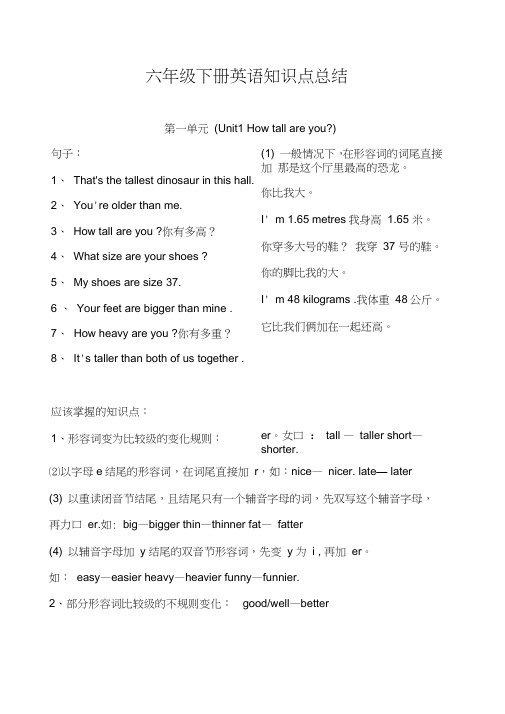
六年级下册英语知识点总结第一单元(Unit1 How tall are you?)句子:1、That's the tallest dinosaur in this hall.2、You're older than me.3、How tall are you ?你有多高?4、What size are your shoes ?5、My shoes are size 37.6 、Your feet are bigger than mine .7、How heavy are you ?你有多重?8、It's taller than both of us together .应该掌握的知识点:1、形容词变为比较级的变化规则:(1) 一般情况下,在形容词的词尾直接加那是这个厅里最高的恐龙。
你比我大。
I' m 1.65 metres我身高1.65 米。
你穿多大号的鞋?我穿37 号的鞋。
你的脚比我的大。
I' m 48 kilograms .我体重48公斤。
它比我们俩加在一起还高。
er。
女口: tall —taller short—shorter.⑵以字母e结尾的形容词,在词尾直接加r,如:nice—nicer. late— later(3) 以重读闭音节结尾,且结尾只有一个辅音字母的词,先双写这个辅音字母,再力口er.如: big—bigger thin—thinner fat—fatter(4) 以辅音字母加y 结尾的双音节形容词,先变y 为i , 再加er。
如:easy—easier heavy—heavier funny—funnier.2、部分形容词比较级的不规则变化:good/well—better3、 比较级的标志:tha n 。
弓I 导比较级的特殊疑问词: Which 。
句子结构为:Which+名词+is+形容词比较级。
比较级+and+比较级表示:越来越 ...4、 A 与 B 比较的句子结构: A+be 动词+形容词比较级 +than+B. 否定句句子结 构:A+be 动词+not+形容词比较级+than+B. —般疑问句句子结构:Be 动词+A + 形容词比较级 +than+B ?A 比B 多多少的句子结构:A+be 动词+数字+单位+形容词比较级+than+B 。
pep六年级英语下册知识点总结
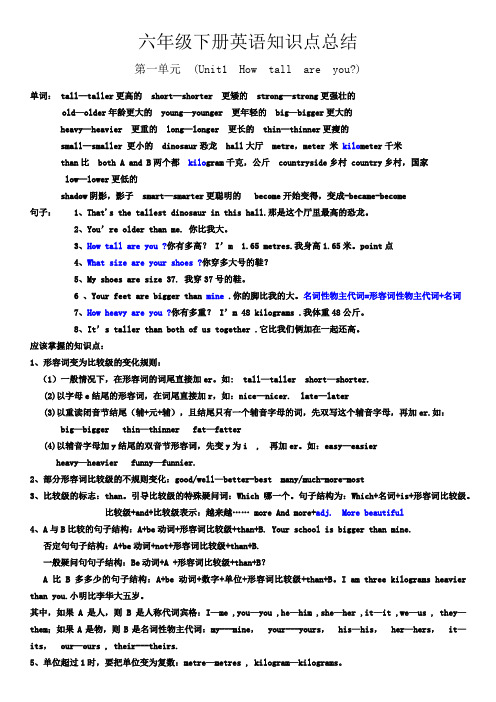
六年级下册英语知识点总结第一单元(Unit1 How tall are you?)单词: tall—taller更高的short—shorter 更矮的strong—strong更强壮的old—older年龄更大的young—younger 更年轻的big—bigger更大的heavy—heavier 更重的long—longer 更长的thin—thinner更瘦的small—smaller 更小的 dinosaur恐龙 hall大厅 metre,meter 米kilo meter千米than比 both A and B两个都 kilo gram千克,公斤 countryside乡村 country乡村,国家low—lower更低的shadow阴影,影子 smart—smarter更聪明的 become开始变得,变成-became-become句子: 1、That's the tallest dinosaur in this hall.那是这个厅里最高的恐龙。
2、You’re older than me. 你比我大。
3、How tall are you ?你有多高? I’m 1.65 metres.我身高1.65米。
point点4、What size are your shoes ?你穿多大号的鞋?5、My shoes are size 37. 我穿37号的鞋。
6 、Your feet are bigger than mine .你的脚比我的大。
名词性物主代词=形容词性物主代词+名词7、How heavy are you ?你有多重? I’m 48 kilograms .我体重48公斤。
8、It’s taller than both of us together .它比我们俩加在一起还高。
应该掌握的知识点:1、形容词变为比较级的变化规则:(1)一般情况下,在形容词的词尾直接加er。
如: tall—taller short—shorter.(2)以字母e结尾的形容词,在词尾直接加r,如:nice—nicer. late—later(3)以重读闭音节结尾(辅+元+辅),且结尾只有一个辅音字母的词,先双写这个辅音字母,再加er.如:big—bigger thin—thinner fat—fatter(4)以辅音字母加y结尾的双音节形容词,先变y为i , 再加er。
人教版六年级英语下册各单元必背词汇和句型
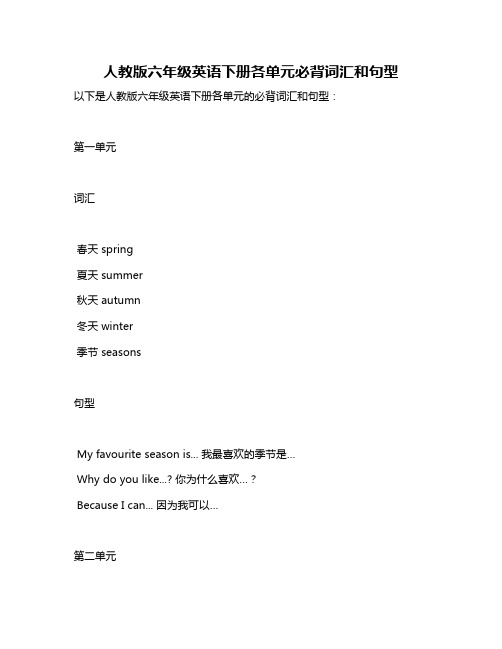
人教版六年级英语下册各单元必背词汇和句型以下是人教版六年级英语下册各单元的必背词汇和句型:第一单元词汇春天 spring夏天 summer秋天 autumn冬天 winter季节 seasons句型My favourite season is... 我最喜欢的季节是…Why do you like...? 你为什么喜欢…?Because I can... 因为我可以…第二单元词汇游泳 swim滑冰 skate放风筝 fly a kite堆雪人 make a snowman季节活动 seasonal activities句型What do you do in the...? 你在…做什么?I usually... 我通常…Do you often...? 你经常…吗?Yes, I do. / No, I don’t. 是的,我经常。
/ 不,我不经常。
第三单元词汇星期一 Monday星期二 Tuesday星期三 Wednesday星期四 Thursday星期五 Friday星期六 Saturday星期日 Sunday星期 weekdays星期天 weekends句型What do you have on...? 你星期几有什么课?I have... 我星期几有…课。
When do you have...? 你什么时候有…课? I have... on... 我在星期几有…课。
第四单元词汇电影 movies公园 parks图书馆 libraries博物馆 museums商店 shops饭店 restaurants医院 hospitals学校 schools银行 banks邮局 post offices公共场所 public places 句型。
(完整版)六年级下册英语知识点总结

(完整版)六年级下册英语知识点总结六年级下册英语知识点总结第一单元(Unit1 How tall are you?)单词:tall—taller更高的short—shorter 更矮的strong—strong更强壮的old—older年龄更大的young—younger 更年轻的big—bigger更大的heavy—heavier 更重的long—longer 更长的thin—thinne更瘦的small—smaller 更小的dinosaur恐龙hall大厅metre,meter 米than比both 两个都kilogram千克,公斤countryside乡村low—lower更低的shadow阴影,影子smart—smarter更聪明的become开始变得,变成句子:1、That's the tallest dinosaur in this hall.那是这个厅里最高的恐龙。
2、You’re older than me. 你比我大。
3、How tall are you ?你有多高?I’m 1.65 metres.我身高1.65米。
4、What size are your shoes ?你穿多大号的鞋?5、My shoes are size 37. 我穿37号的鞋。
6 、Your feet are bigger than mine .你的脚比我的大。
7、How heavy are you ?你有多重?I’m 48 kilograms .我体重48公斤。
8、It’s taller than both of us togethe r .它比我们俩加在一起还高。
应该掌握的知识点:1、形容词变为比较级的变化规则:(1)一般情况下,在形容词的词尾直接加er。
如: tall—taller short—shorter.(2)以字母e结尾的形容词,在词尾直接加r,如:nice—nicer. late—later(3)以重读闭音节结尾,且结尾只有一个辅音字母的词,先双写这个辅音字母,再加er.如:big—bigger thin—thinner fat—fatter(4)以辅音字母加y结尾的双音节形容词,先变y为i , 再加er。
新人教版(PEP)小学英语六年级下册各单元知识点总结
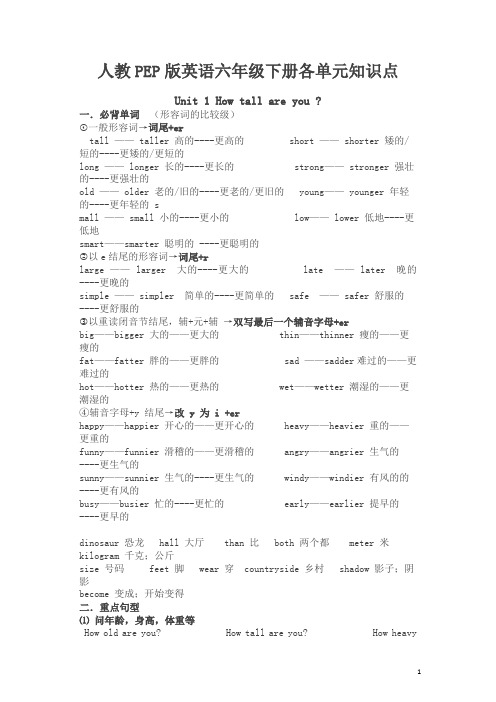
人教PEP版英语六年级下册各单元知识点Unit 1 How tall are you ?一.必背单词(形容词的比较级)①一般形容词→词尾+ertall —— taller 高的----更高的 short —— shorter 矮的/短的----更矮的/更短的long —— longer 长的----更长的 strong—— stronger 强壮的----更强壮的old —— older 老的/旧的----更老的/更旧的 young—— younger 年轻的----更年轻的 small —— small 小的----更小的 low—— lower 低地----更低地smart——smarter 聪明的 ----更聪明的②以e结尾的形容词→词尾+rlarge —— larger 大的----更大的 late —— later 晚的----更晚的simple —— simpler 简单的----更简单的 safe —— safer 舒服的----更舒服的③以重读闭音节结尾,辅+元+辅→双写最后一个辅音字母+erbig——bigger 大的——更大的 thin——thinner 瘦的——更瘦的fat——fatter 胖的——更胖的 sad ——sadder难过的——更难过的hot——hotter 热的——更热的 wet——wetter 潮湿的——更潮湿的④辅音字母+y 结尾→改 y 为 i +erhappy——happier 开心的——更开心的 heavy——heavier 重的——更重的funny——funnier 滑稽的——更滑稽的 angry——angrier 生气的----更生气的sunny——sunnier 生气的----更生气的 windy——windier 有风的的----更有风的busy——busier 忙的----更忙的 early——earlier 提早的----更早的dinosaur 恐龙 hall 大厅 than 比 both 两个都 meter 米kilogram 千克;公斤size 号码 feet 脚 wear 穿 countryside 乡村 shadow 影子;阴影become 变成;开始变得二.重点句型⑴ 问年龄,身高,体重等How old are you? How tall are you? How heavyare you?--- I’m _______ (years old). --- I’m ______metres tall. ---- I’m ______ kilograms .⑵ 问物品的情况:① How large is your room? 你的房间有多大?It’s ______ m (square meters.) 有___平方米。
人教版小学六年级英语下册期末复习各单元知识点汇集
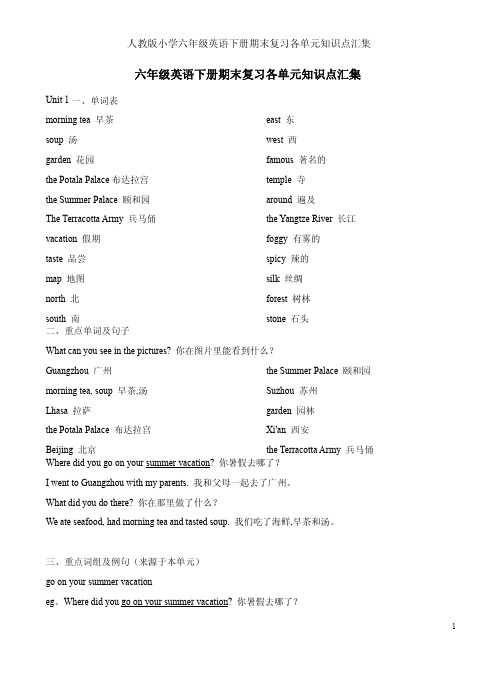
六年级英语下册期末复习各单元知识点汇集Unit1一、单词表morning tea早茶soup汤garden花园the Potala Palace布达拉宫the Summer Palace颐和园The Terracotta Army兵马俑vacation假期taste品尝map地图north北south南east东west西famous著名的temple寺around遍及the Yangtze River长江foggy有雾的spicy辣的silk丝绸forest树林stone石头二、重点单词及句子What can you see in the pictures?你在图片里能看到什么?Guangzhou广州morning tea,soup早茶,汤Lhasa拉萨the Potala Palace布达拉宫Beijing北京the Summer Palace颐和园Suzhou苏州garden园林Xi'an西安the Terracotta Army兵马俑Where did you go on your summer vacation?你暑假去哪了?I went to Guangzhou with my parents.我和父母一起去了广州。
What did you do there?你在那里做了什么?We ate seafood,had morning tea and tasted soup.我们吃了海鲜,早茶和汤。
三、重点词组及例句(来源于本单元)go on your summer vacationeg、Where did you go on your summer vacation?你暑假去哪了?eat seafood海鲜have morning tea早茶have tasted soupeg、We ate seafood,had morning tea and tasted soup.我们吃了海鲜,早茶和汤。
2020新人教版(PEP)小学英语六年级下册各单元知识点总结
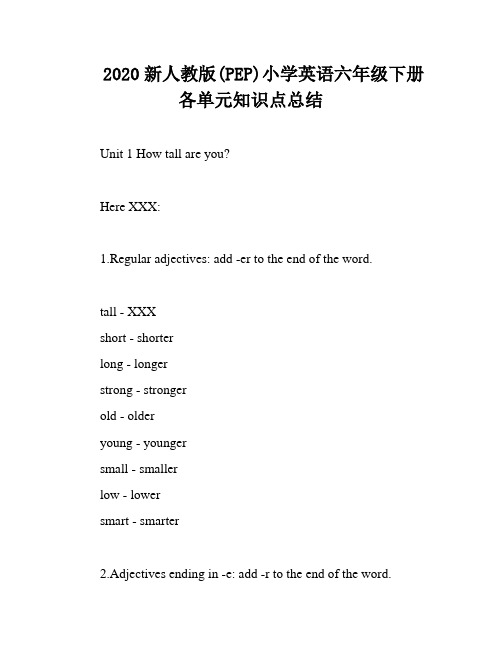
2020新人教版(PEP)小学英语六年级下册各单元知识点总结Unit 1 How tall are you?Here XXX:1.Regular adjectives: add -er to the end of the word.tall - XXXshort - shorterlong - longerstrong - strongerold - olderyoung - youngersmall - smallerlow - lowersmart - smarter2.Adjectives ending in -e: add -r to the end of the word.large - largerlate - latersimple - simplersafe - safer3.Adjectives XXX: double the final consonant and add -er.big - biggerXXX - XXXfat - fattersad - sadderhot - hotterwet - wetter4.Adjectives ending in -y: change the -y to -i and add -er.happy - happierheavy - XXXXXX - funnierangry - angrierXXX - XXXwindy - windierbusy - busierearly - earlierXXX:dinosaur。
hall。
than。
both。
meter。
kilogram。
size。
feet。
wear。
countryside。
shadow。
e.Here XXX:1.Asking about age。
height。
weight。
etc.How old are you?How tall are you?How heavy are you?I am (age) years old。
PEP人教版小学英语六年级下册Unit 2单元知识梳理总结
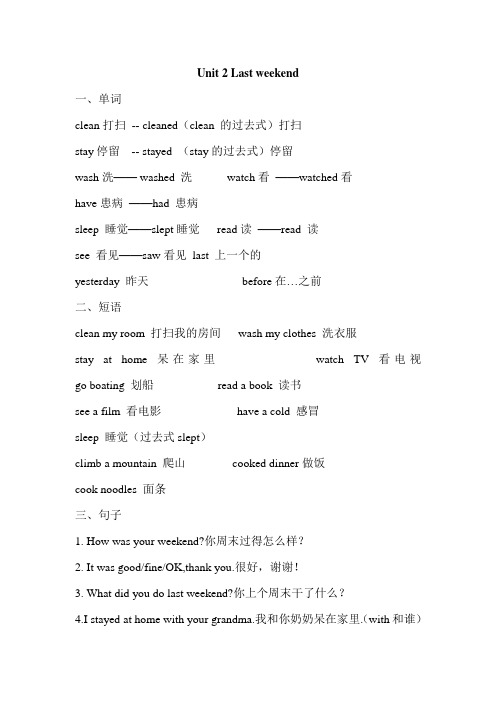
Unit 2 Last weekend一、单词clean打扫-- cleaned(clean 的过去式)打扫stay停留-- stayed (stay的过去式)停留wash洗—— washed 洗watch看——watched看have患病——had 患病sleep 睡觉——slept睡觉read读——read 读see 看见——saw看见last 上一个的yesterday 昨天before在…之前二、短语clean my room 打扫我的房间wash my clothes 洗衣服stay at home 呆在家里watch TV 看电视go boating 划船read a book 读书see a film 看电影have a cold 感冒sleep 睡觉(过去式slept)climb a mountain 爬山cooked dinner做饭cook noodles 面条三、句子1. How was your weekend?你周末过得怎么样?2. It was good/fine/OK,thank you.很好,谢谢!3. What did you do last weekend?你上个周末干了什么?4.I stayed at home with your grandma.我和你奶奶呆在家里.(with和谁)5. Did you do anything else?你还做了其他什么事吗?6. Yes,I cleaned my room and washed my clothes.是的,我扫了房间,还洗了衣服。
7.I want to buy the new film magazine.我想买期新的电影杂志。
8.Did you see a film?你看电影了吗?No,I didn’t .I had a cold. I stayed at home all weekend and slept.没有,我感冒了。
六年级下册人教版(PEP)英语第二单元知识点

练习:规则动词
work__w_or_k_ed play__p_la_y_ed want__w_a_nt_ed
look__lo_ok_e_d watch__w_a_tc_hed live___liv_e_d
move__m_o_ve_d taste__ta_s_te_d hope__h_op_e_d
love__lo_ve_d_ liwas your weekend? 答:It was+形容词.
二.一般过去时标志词(过去的时间)
③ago系列 一段时间+ago:…前 (几年/几个月/几天/几周)+ago (几小时/几分钟/几秒)+ago two years ago两年前 three months ago三个月前 four weeks ago四周前
five days ago五天前 an hour ago一小时前 five minutes ago五分钟前 two seconds ago两秒前
二.一般过去时标志词(过去的时间)
①yesterday系列:昨天 yesterday+(早/中/晚) yesterday morning昨天早上 yesterday afternoon昨天下午 yesterday evening昨天晚上 the day before yesterday前天
二.一般过去时标志词(过去的时间)
4.你们上周做什么了? 我们打扫教室了。 What did you do last week? We cleaned our classroom. 5.他上周末做了什么? 他呆在家里了。 What did he do last weekend? He stayed at home.
6.她上周五做了什么? 她看了一本书。 What did you do last Friday? She read a book.
小学英语人教精通版六年级下册重点归纳

小学英语人教精通版六年级下册重点归纳第一单元Unit1 I went to Sanya for my holidays.重点单词:Sun 太阳moon月亮star星星Learn 学习;学到word 单词;词blackboard黑板say 说subject学科but 但是yesterday昨天why 为什么use用重点短语:1.by plane 乘飞机2.at night 在晚上3.at home 在家里4.a lot of 很多5.go to the beach 去沙滩6.do tasks 做任务7.act in drama 表演戏剧8.stay at home 待在家里9.have a party 聚会10.enjoy Spring Festive 过春节11.listen to music 听音乐12.speak English 讲英语13.read English 读英语14.write E n glish 写英语15.talk in English n用英语交谈16.play in English 用英语玩游戏17.enjoy sunbathing享受日光浴18.have an English party举办英语聚会19.enjoy the moon and stars看月亮和醒醒20.learn from each other 互相学习。
重点句型:1. We have learned a lot of English words我. 们学了很多英语单词。
2. We learned from each other我. 们互相学习。
2.What did you do for your holidays?你假期做了什么?3.I went to Sanya.我去了三亚。
4.We are very interested in English我. 们对英语很感兴趣。
5.How did you learn English?你(们)是怎么学英语的?6.We learned English by doing things我. 们通过做事情来学英语。
- 1、下载文档前请自行甄别文档内容的完整性,平台不提供额外的编辑、内容补充、找答案等附加服务。
- 2、"仅部分预览"的文档,不可在线预览部分如存在完整性等问题,可反馈申请退款(可完整预览的文档不适用该条件!)。
- 3、如文档侵犯您的权益,请联系客服反馈,我们会尽快为您处理(人工客服工作时间:9:00-18:30)。
六年级英语下册第二单元知识点整理人
教版
第二单元
一、单词
clean打扫--cleaned(clean的过去式)打扫
stay停留
--stayed(stay的过去式)停留
wash洗——washed洗
watch看——watched看
have患病——had患病
sleep睡觉——slept睡觉
read读——read读
see看见——saw看见last上一个的
yesterday昨天
before在…之前
二、短语
cleanmyroom打扫我的房间
washmyclothes洗衣服
stayathome呆在家里
watchTV看电视
goboating划船
readabook读书
seeafilm看电影
haveacold感冒
sleep睡觉(过去式slept)
climbamountain爬山
cookeddinner做饭
cooknoodles面条
三、句子
.Howwasyourweekend?你周末过得怎么样?
2.Itwasgood/fine/ok,thankyou.很好,谢谢!
3.whatdidyoudolastweekend?你上个周末干了什么?
4.Istayedathomewithyourgrandma.我和你奶奶呆在家里.(with和谁)
5.Didyoudoanythingelse?你还做了其他什么事吗?
6.yes,Icleanedmyroomandwashedmyclothes.是的,我扫了房间,还洗了衣服。
7.Iwanttobuythenewfilmmagazine.我想买期新的电影杂志。
8.Didyouseeafilm?你看电影了吗?
No,Ididn’t.Ihadacold.Istayedathomeallweekendandslept.没有,我感冒了。
整个周末都呆在家里睡觉。
四、语法知识:
一般过去时
.一般过去时表示过去某个时间发生的动作或存在的状态,常和表示过去的时间状语连用。
一般过去时也表示过去经常或反复发生的动作感谢。
2.Be动词在一般过去时中的变化:
⑴am和is在一般过去时中变为was。
(wasnot=wasn’t)
⑵are在一般过去时中变为were。
(werenot=weren’t)
⑶带有was或were的句子,其否定、疑问的变化和is,am,are一样,即否定句在was或were后加not,一般疑问句把was或were调到句首。
3.句中没有be动词的一般过去时的句子
否定句:didn’t+动词原形,如:jimdidn’tgohomeyesterday.
一般疑问句:在句首加did,句子中的动词过去式变回原形。
如:Didjimgohomeyesterday?
特殊疑问句:疑问词+did+主语+动词原形?
如:whatdidyoudoyesterday?Ireadabook.。
